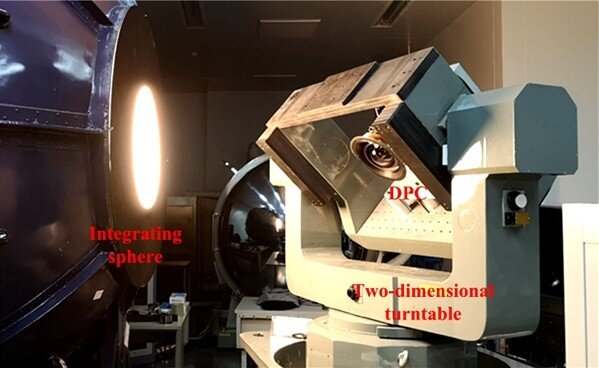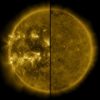Recently, researchers from the Optical Remote Sensing Center of the Anhui Institute of Optics and Fine Mechanics (AIOFM), Hefei Institutes of Physical Science (HFIPS) have successfully improved the accuracy of directional polarimetric camera (DPC) laboratory polarization calibration via new methods.
DPC, which has been successfully launched on GaoFen-5 Satellite, is a satellite-borne sensor with multi-angle, multi-spectrum and polarization detection capability for the characterization of atmospheric aerosols and clouds. High accuracy laboratory calibration of the radiation and polarization characteristics of DPC are the key factors to ensure accuracy.
This time, the researchers systematically analyzed the influence of each parameter on the polarization measurement error of DPC before putting forward a series of schemes.
They increased the sampling points to obtain the diattenuation of the optics corresponding with each pixel, established the objective equation for optimal solution of absolute azimuth angles, and calculated the relative transmission of each pixel so that the original relative transmission to central field of view could be replaced.
In this way, they finally achieved higher polarization measurement accuracy on DPC.
In order to verify the effect of the improved measurement scheme, two experiments based on an integrating sphere non-polarized radiation source and a polarizing system were carried out in the laboratory respectively.
The results showed that the polarization measurement errors of the two verification experiments were less than 0.01 and 0.005 respectively when the parameters obtained by the new calibration scheme were used to calculate the degree of linear polarization, which was greatly improved compared with the original calibration scheme.
These methods, which can be applied to polarization calibration of DPC, as well as other similar polarization optical instruments with large field of view, are important progress in the field of multi-angle polarization remote sensing detection.
Precision calibration empowers largest solar telescope
More information:
Chan Huang et al. Polarization measurement accuracy analysis and improvement methods for the directional polarimetric camera, Optics Express (2020). DOI: 10.1364/OE.405834
Chan Huang et al. Pre-flight calibration of a multi-angle polarimetric satellite sensor directional polarimetric camera, Optics Express (2020). DOI: 10.1364/OE.391078
Chan Huang et al. Geometric calibration method based on a two-dimensional turntable for a directional polarimetric camera, Applied Optics (2019). DOI: 10.1364/AO.59.000226
Chan Huang et al. Directional polarimetric camera stray light analysis and correction, Applied Optics (2019). DOI: 10.1364/AO.58.007042
Provided by
Chinese Academy of Sciences
Citation:
Scientists further improve accuracy of directional polarimetric camera (2020, December 30)
retrieved 30 December 2020
from https://phys.org/news/2020-12-scientists-accuracy-polarimetric-camera.html
This document is subject to copyright. Apart from any fair dealing for the purpose of private study or research, no
part may be reproduced without the written permission. The content is provided for information purposes only.



